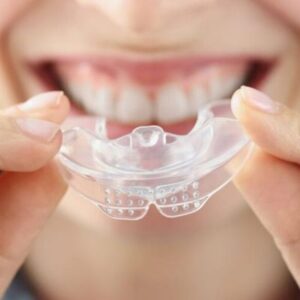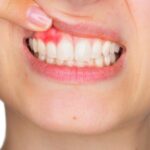
Stress can dry your mouth, inflame your gums, and make you clench or grind your teeth. That combo raises your risk of cavities, cracks, jaw pain, and canker sores. The fix is part elements of dental care that can include using fluoride, night guards and regular cleanings. The other part is lifestyle including sleep, hydration and jaw-relaxation habits.
At the dentist, we can often spot a stressful season before you even tell me about it. There are telltale signs including worn biting edges, sore jaw muscles, tender gums and cavities in people who rarely get them.
Stress doesn’t just live in your head—it shows up in your mouth. The good news: once you understand the “stress-to-mouth” connection, there’s a lot you can do to protect your smile.

How Stress Affects Your Mouth (The Simple Science)
Stress turns on your body’s “fight or flight” response. That raises cortisol and adrenaline, which:
- Reduces saliva flow. Saliva buffers acids, carries minerals that re-harden enamel, and washes away food debris. Less saliva = higher risk of cavities and bad breath.
- Increases inflammation. If your gums already have plaque buildup, stress can amplify inflammation and bleeding.
- Changes habits. We clench, grind, snack more often, sip more coffee/energy drinks, skip flossing, and stay up late—each of which harms oral health.

The 7 Most Common Stress-Linked Dental Problems
- Clenching & Grinding (Bruxism)
Many patients clench during the day or grind at night. This can chip teeth, crack fillings, and make your jaw muscles feel tight or achy. You may notice morning headaches or sensitivity when chewing from bruxism. - TMJ & Jaw Pain
Persistent tension overloads the temporomandibular joints (TMJs). Symptoms include clicking, limited opening, ear fullness, and pain that radiates to the temples or neck. - Dry Mouth (Xerostomia)
Stress, dehydration, and some medications can dry your mouth. Without saliva’s protective film, cavities form faster and breath worsens. - Gum Inflammation & Gum Disease Flare-Ups
Stress can impact healthy gums. It will reduce immune efficiency, making it harder to control gum-causing bacteria. If your gums bleed when brushing or you notice swelling, that’s a red flag. - Cavities & Enamel Wear
Frequent snacking on comfort foods, sipping acidic drinks, and reduced saliva create a perfect storm for decay. Grinding also wears enamel, making teeth more sensitive. - Canker Sores & Cold Sore Flare-Ups
Stress is a known trigger for aphthous ulcers (canker sores). For those with the herpes simplex virus, stress can also trigger cold sores on the lip. - Acid Reflux–Related Erosion
Stress can aggravate reflux, bringing acid into contact with teeth and dissolving enamel—especially on the inside surfaces.

Quick Wins You Can Start Today
Although you always want to be sure that your issues are not linked to a bigger dental problem, there are some things you can do to help your oral health when you are going through stressful periods.
- Hydrate on a schedule. Keep water at your desk. If your mouth is dry, sip frequently and consider a saliva substitute or xylitol gum.
- Place a sticky note: “Lips together, teeth apart.” This cue helps you avoid daytime clenching.
- Switch to fluoride toothpaste & a fluoride mouth rinse. Fluoride strengthens enamel and helps reverse early decay.
- Rinse after coffee/energy drinks. A simple water rinse reduces acid contact time.
- Create a 2-minute bedtime routine. Brush thoroughly for two minutes, floss once daily (night is best), then apply fluoride rinse.
- Protect sleep. Quality sleep lowers stress hormones and reduces nighttime grinding intensity.

When a Night Guard Helps (and When It Doesn’t)
A night guard doesn’t stop grinding, but it absorbs the force and protects teeth, fillings, and veneers from fractures and wear. Consider one if you have:
- Chipped or cracked teeth/fillings
- Morning jaw pain or headaches
- Visible flat spots on your biting surfaces
- Ongoing orthodontic or restorative work you want to protect
Over-the-counter boil-and-bite guards can be a temporary solution, but they often fit poorly. A custom guard balances your bite, lasts longer, and is more comfortable—so you’ll actually wear it.

A 2-Minute “Jaw Reset” You Can Do Anywhere
- Posture: Sit tall with shoulders soft, feet flat.
- Breath: Inhale through your nose for 4 counts, exhale for 6 counts, twice.
- Tongue rest: Place the tip of your tongue gently on the spot just behind your front teeth (the “N” spot).
- Release: Let your teeth be apart, lips together, jaw hanging slightly.
- Scan: With two fingers, gently massage along the jawline (under cheekbones) for 30–60 seconds.
- Finish: Slowly open and close halfway five times, keeping the jaw centered and relaxed.
Repeat this “reset” during high-stress tasks including work situations, traffic, and stressful deadlines.
When to Call Your Dentist
Anyone can go through periods of stress, but any prolonged issues can cause lasting damage. Early care prevents bigger (and more serious) problems.
Here are few indicators you should call the dentist with an issue:
- Jaw pain, popping, or locking that lasts more than a week
- Teeth that feel loose, chipped, or suddenly sensitive
- Mouth sores that don’t improve in 10–14 days
- Gums that bleed easily despite daily brushing and flossing
- Frequent headaches upon waking or noticeable tooth wear
Your Next Best Step
If stress has been high lately, schedule a comprehensive exam and cleaning. We’ll check for signs of grinding, measure gum health, screen for dry mouth, and discuss whether a custom night guard or high-fluoride plan makes sense for you.
We can even do an oral microbiome test to see if there is anything else happening with your body. A few small changes—better hydration, a consistent bedtime routine, and jaw-relaxation cues—can protect your smile through even the busiest season.
Questions Patient Often Ask Us
Can stress cause cavities?
Indirectly, yes. Stress dries your mouth and changes habits (snacking, poor sleep), which increases cavity risk.
Does clenching damage teeth?
Yes. Chronic clenching/grinding can crack enamel, wear teeth flat, and strain jaw joints and muscles.
What helps stress-related jaw pain fast?
Start with a soft diet for 48–72 hours, an anti-inflammatory as directed by your physician, warm compresses, and the “jaw reset” routine. If pain persists, see your dentist.
Is a night guard worth it?
For many grinders, absolutely. It protects teeth and dental work and often reduces morning soreness. This simple appliance saves teeth from needing extensive dental work that occurs when teeth chip, break, and fracture over time.
Can stress make gum disease worse?
Yes. Stress can intensify inflammation and impair healing, making it harder to control gum infections.


